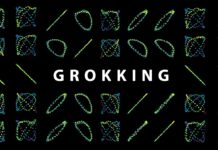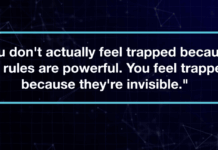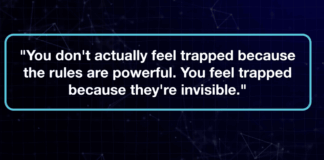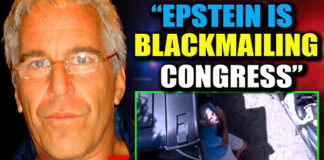Explosive new evidence uncovered in a two-years long investigation reveals that one of the authors of a retracted paper revealing the Covid vaccines’ potential to cause cancers never agreed to its retraction, which she now claims was “forced” in “violation of academic ethics.” Emails obtained under FOIA corroborate her story.
The scandal involving Stockholm University, reputable peer-reviewed science publisher MDPI, and a high-level National Institutes for Health (NIH) employee has serious implications for scientific integrity, and for the risk of cancer globally – predominantly for women.
In October 2021, an important scientific paper was published in the peer-reviewed journal, MDPI Viruses,1 highlighting that the spike protein from both the SARS-Cov-2 virus and the associated vaccines* damages key DNA repair pathways.
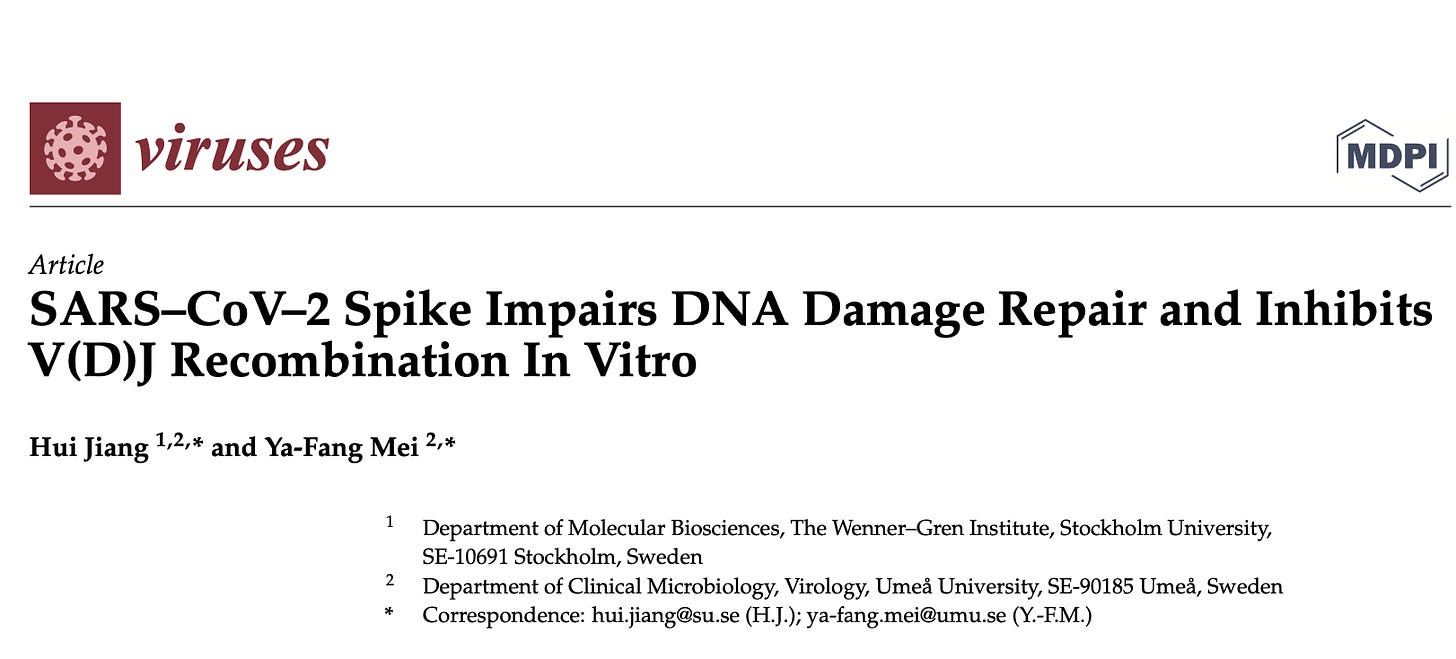
The study generated a lot of publicity due to its implications for immune suppression and cancers arising from repeat exposure to Covid infections and vaccination. The authors’ findings have since been confirmed in other peer-reviewed scientific studies, but in the highly-politicised environment at the time, they were new and controversial.
The study was then swiftly retracted under strange circumstances, with the lead author requesting the retraction of his own paper. Stranger still, the same editor who approved the paper for publication then did a 180 and approved its retraction. Some speculated that Jiang had been pressured to request the retraction in a politically-motivated effort to bury evidence of Covid vaccine harms.
Now, one of the authors of the study alleges that this was indeed the case.
“Stockholm University initially decided to retract the paper without the authors’ consent, a clear violation of academic ethics.” – Dr Ya-Fang Me The paper, titled ‘SARS-CoV-2 Spike Impairs DNA Damage Repair and Inhibits V(D)J Recombination In Vitro’ was authored by Dr Hui Jiang of Stockholm University and Dr Ya-Fang Mei of Umeå University.
In an email exchange, Mei informed me that Stockholm University pressured Jiang to request retraction of the paper, and that she never consented to the retraction.
“Stockholm University initially decided to retract the paper without the authors’ consent, a clear violation of academic ethics,” she said.
“Stockholm University asked the first author, Hui Jiang, to retract it, and they began to formalize the process. This is an illegal retraction. I have reported to the editorial office that the retraction process is incorrect, and I strongly disagree with it.”
Emails released to me under Freedom of Information Act (FOIA) requests from Stockholm University show that Mei very clearly opposed the retraction.
“I absolutely not (sic) accept this retraction.” – Dr Ya-Fang Mei
“I absolutely not (sic) accept this retraction,” she wrote in an email to her co-author on 1 February 2022, just days before Jiang formally lodged his request for retraction with the journal.
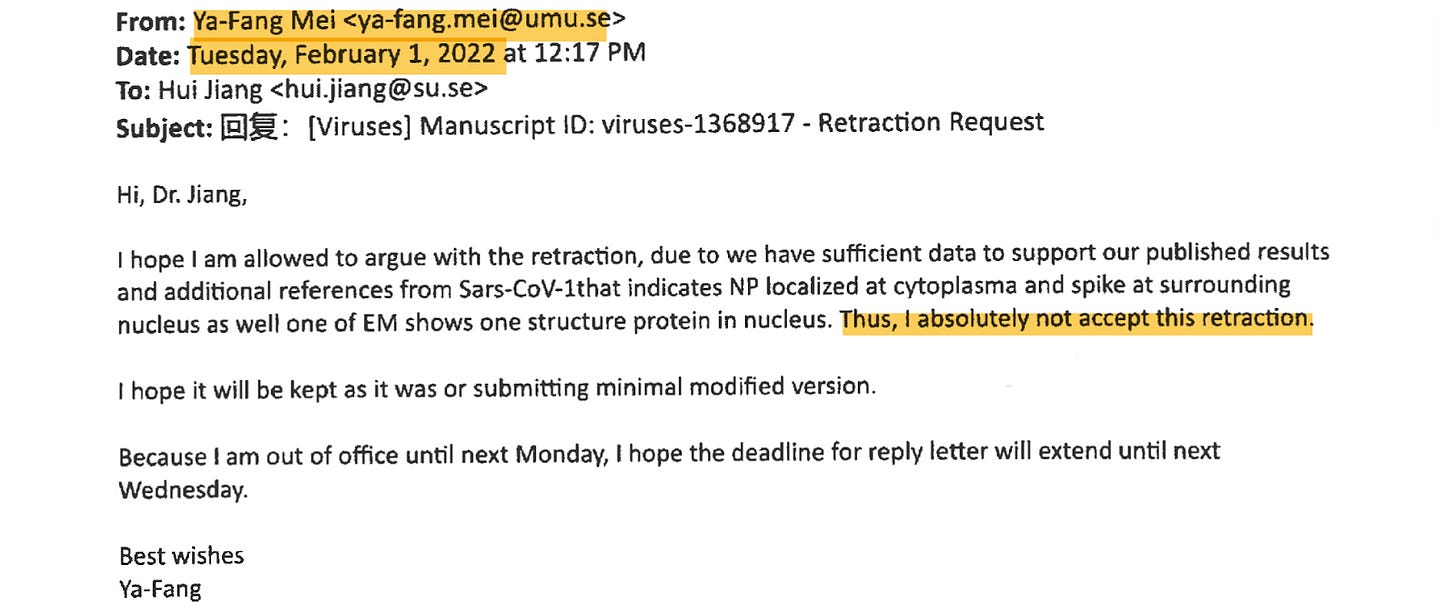
Mei stands by her study’s findings and hoped they could be used to produce better, safer vaccines. “We demonstrated that the SARS-CoV-2 spike protein manifests some disadvantages that must be solved before it becomes a vaccine,” she said.
A retraction notice published in May 2022 cited concerns about the construction of the spike plasmid and the use of a GFP reporter system, rendering the paper unreliable to scientists or commentators wishing to reference or build upon Jiang and Mei’s findings.
However, Mei strongly refutes these concerns, telling me that they are “unfounded and the retraction is unjustified.”
“I strongly disagree [with the retraction notice], because the experiments have a control sample: Nucleoprotein containing 6Histag and GFP report, which localizes in the cell plasmid rather than in the nucleus. Therefore, the notice contains incorrect information.” For this reason, said Mei, “I never signed the retraction notice.”
Emails between the authors, Stockholm University and MDPI reveal that this was a highly unusual retraction, pushed through in a climate of intense public pressure and with scant scientific justification.

‘Not clear if public pressure or scientific faults’ led to retraction
The email records show that lead author Hui Jiang initially requested the retraction of his paper, in a ‘generic’ letter emailed to MDPI on 9 November 2021.
However, the journal pushed back due to lack of evidence of scientific error in the study, and questions over whether the retraction request was motivated by public pressure.
“We have checked your retraction request… and feel the information provided is insufficient,” wrote MDPI Publishing Manager Donna Virlan on 22 November.
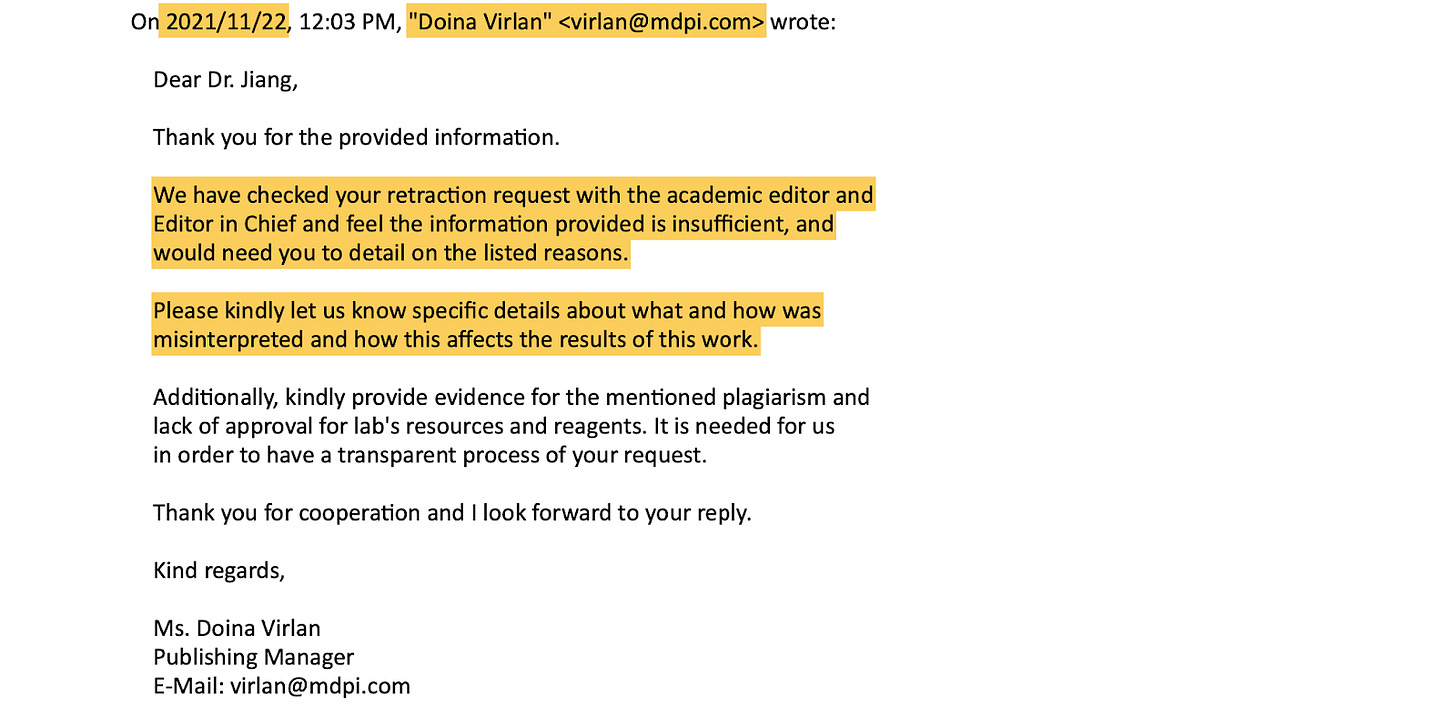
MDPI Assistant Editor Gloria Gao reiterated the lack of scientific justification. “At the moment, the Committee and editors have seen no evidence, and all we hear is that there is some publicity,” she wrote on 24 November.
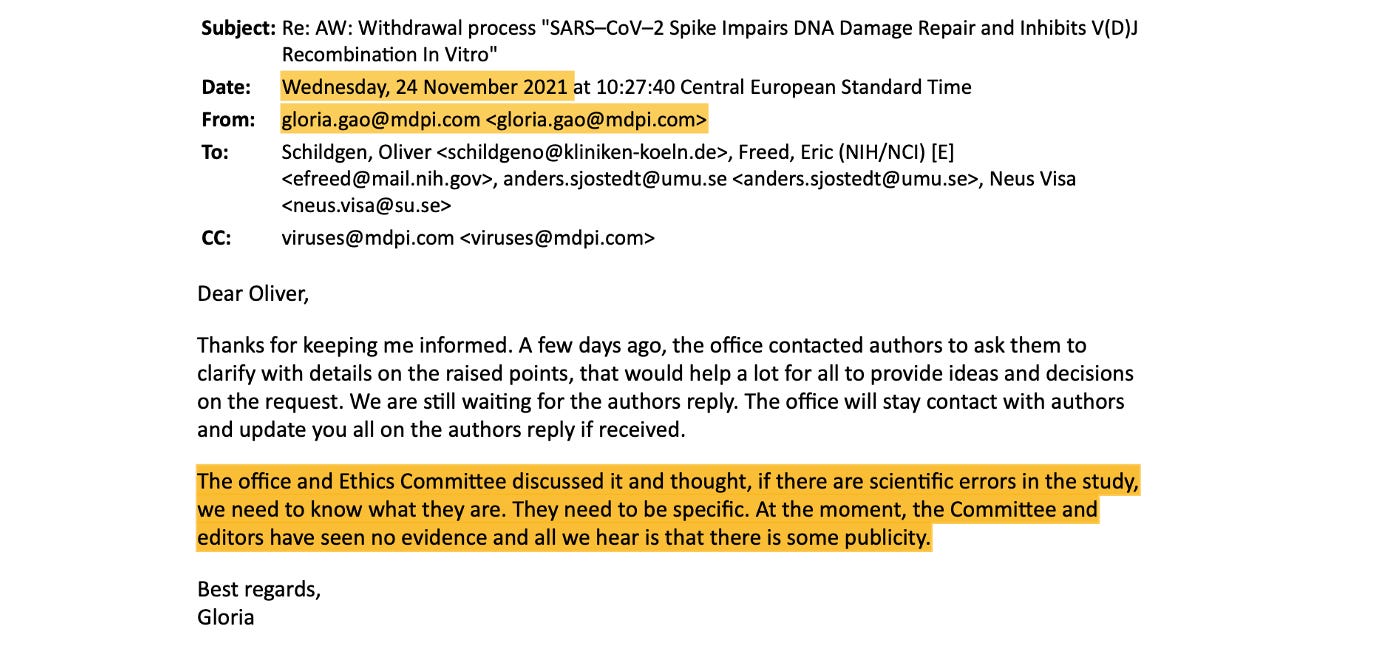
“[We] have seen no evidence, and all we hear is that there is some publicity.” – MDPI Assistant Editor, Gloria Gao
In the same thread, Academic Editor, Dr Oliver Schildgen, who initially approved Jiang and Mei’s paper for publication, described the retraction letter as “rather generic.”
“For me it was not clear if the public pressure or scientific faults were the cause for the requests,” he said, but “we have to be neutral as scientists.”
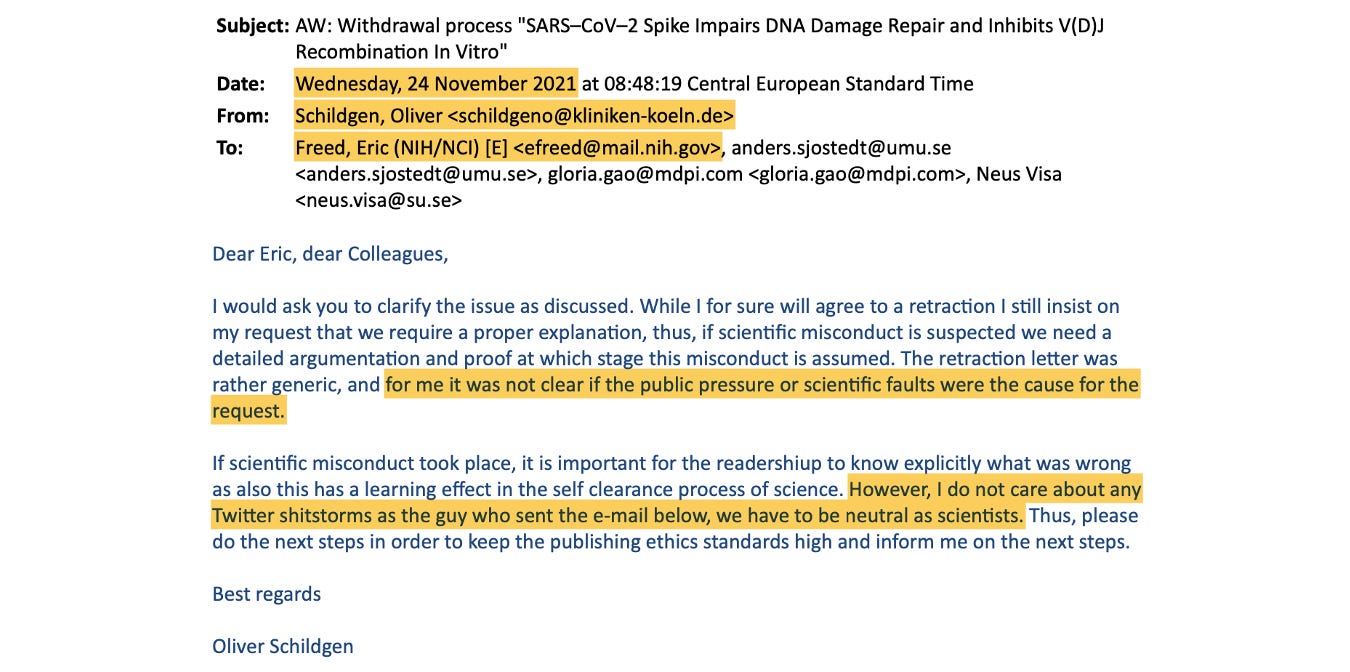
Pressure from academic activism and ‘fact checkers’
“I do not care about Twitter shitstorms,” wrote Schildgen, above.
Others, like German scientist Dr Götz Schuck, cared a lot.
“The publicity surrounding this publication is unusually high,” and “is instrumentalized as a source of misinformation,” complained Schuck in the first of multiple emails to the journal. He states that he separately contacted Umeå University with his complaints.
He urged the journal to bypass normal retraction processes and immediately withdraw the paper because “unusual times call for unusual measures.”


In a follow up email the next day, this time with Stockholm University included, Schuck catastrophised over the “scientific scandal” of the paper remaining online with nearly half a million downloads, urging the journal to “remove the article in question as quickly as possible.”
“You can’t just rely on a scientific investigation of the case. Every day they hesitate enables further dissemination of misinformation related to this publication,” wrote Schuck on 23 November 2022.
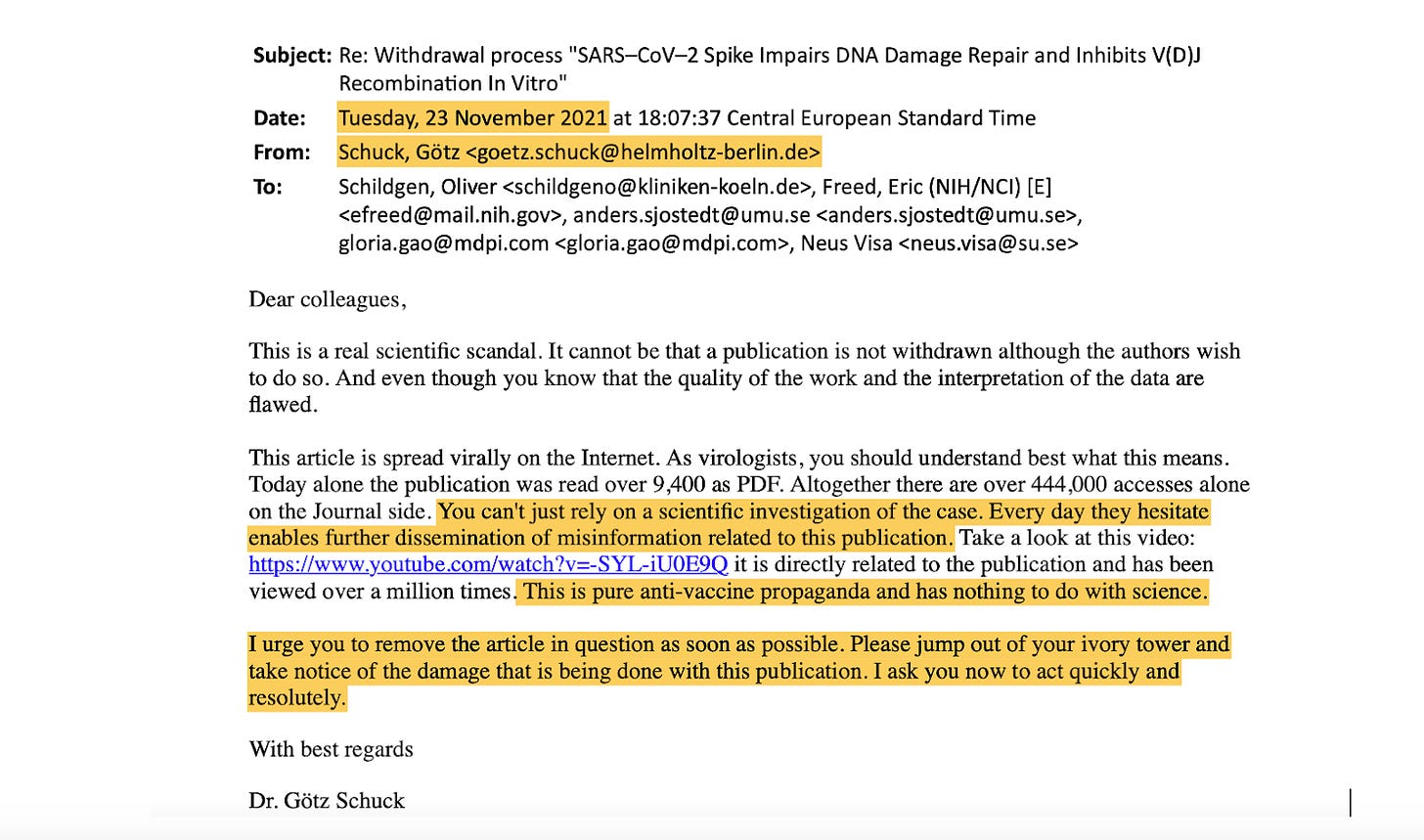
Schildgen replied assuring that correct procedures were being followed, and recommending that any further issues be raised with the Chief Editor (NIH scientist Dr Eric Freed), to whom he formally handed over the case.
“You can’t just rely on a scientific investigation of the case… This publication was hacked by anti-vaccinationists, that’s what it looks like.” – Scientist, Dr Götz Schuck However, Schuck was not placated. He emailed a third time, alleging that MDPI had been “hacked by anti-vaccinationists” and criticising the journal for seeking a scientific explanation for retraction without taking “social relevance” into account.
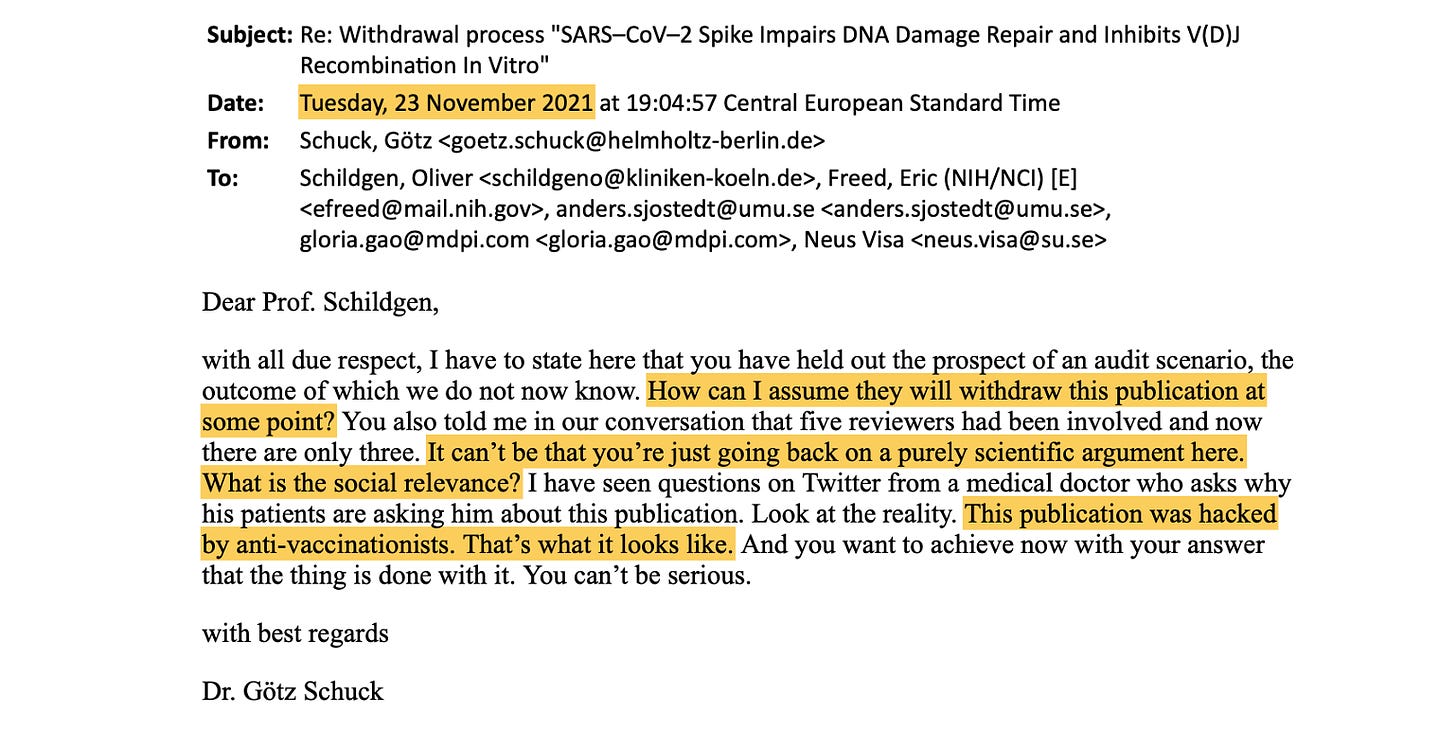
In a reply to Schuck, Prof Neus Visa, Head of the Wenner-Gren Institute where Hui Jiang worked, assured Schuck that “the authors of the article are working on their reply to the journal.” She immediately forwarded the exchange to her counterpart at Umeå University, Anders Sjöstedt, who replied ‘thanks.’
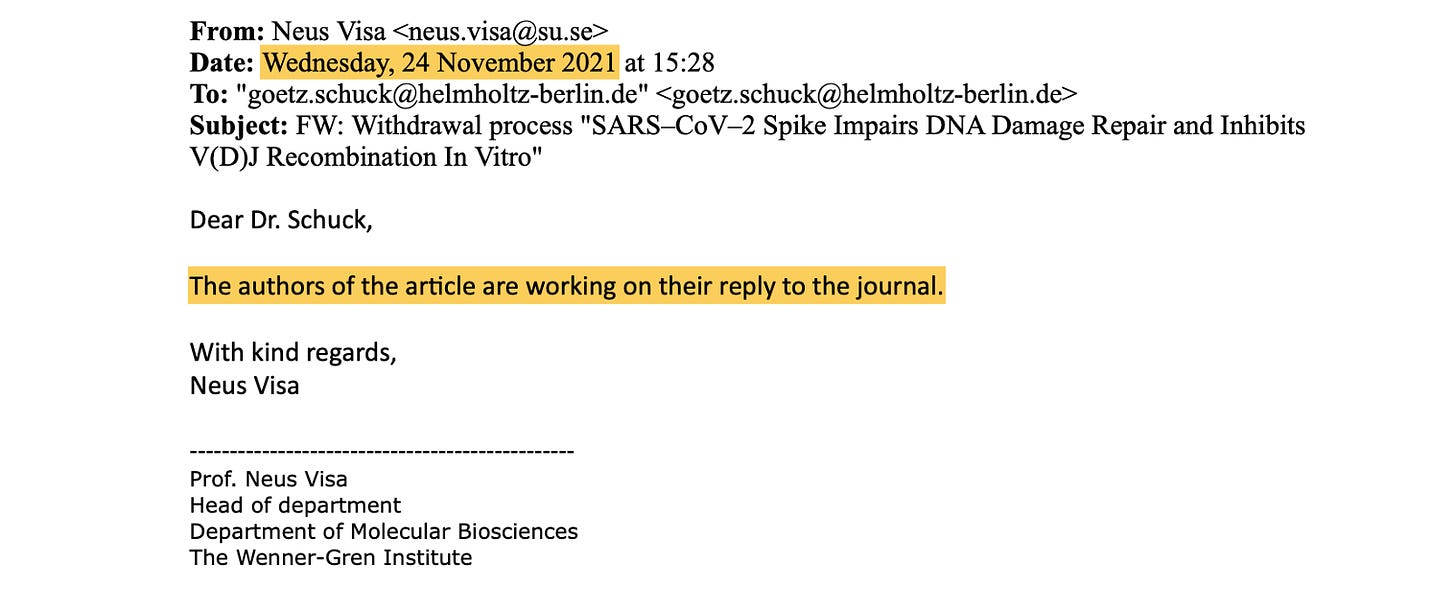
There may well have been more communications of the type sent by Schuck directed towards MDPI, Stockholm University and Umeå University. My FOIA email request only captured emails sent to Hui Jiang between 1 Jan 2022 – 1 June 2022 and to Neus Visa between 01 November 2021 – 16 December 2021.
Additionally, Stockholm University fielded several requests from fact checking organisations about the paper, including Lead Stories and Correctiv.2
Getting the retraction over the line ‘did not require evidence of scientific misconduct’
By early December, the journal was still unsatisfied with the explanations offered for Jiang’s retraction request, but concessions from Stockholm University and NIH scientist and MDPI Chief Editor Eric Freed got it over the line.
On 2 December 2022, Visa advised the editors,
“I am writing to confirm that Hui Jiang is employed as a research engineer at our department and that he carried out the published studies without approval for lab’s resources and reagents.”
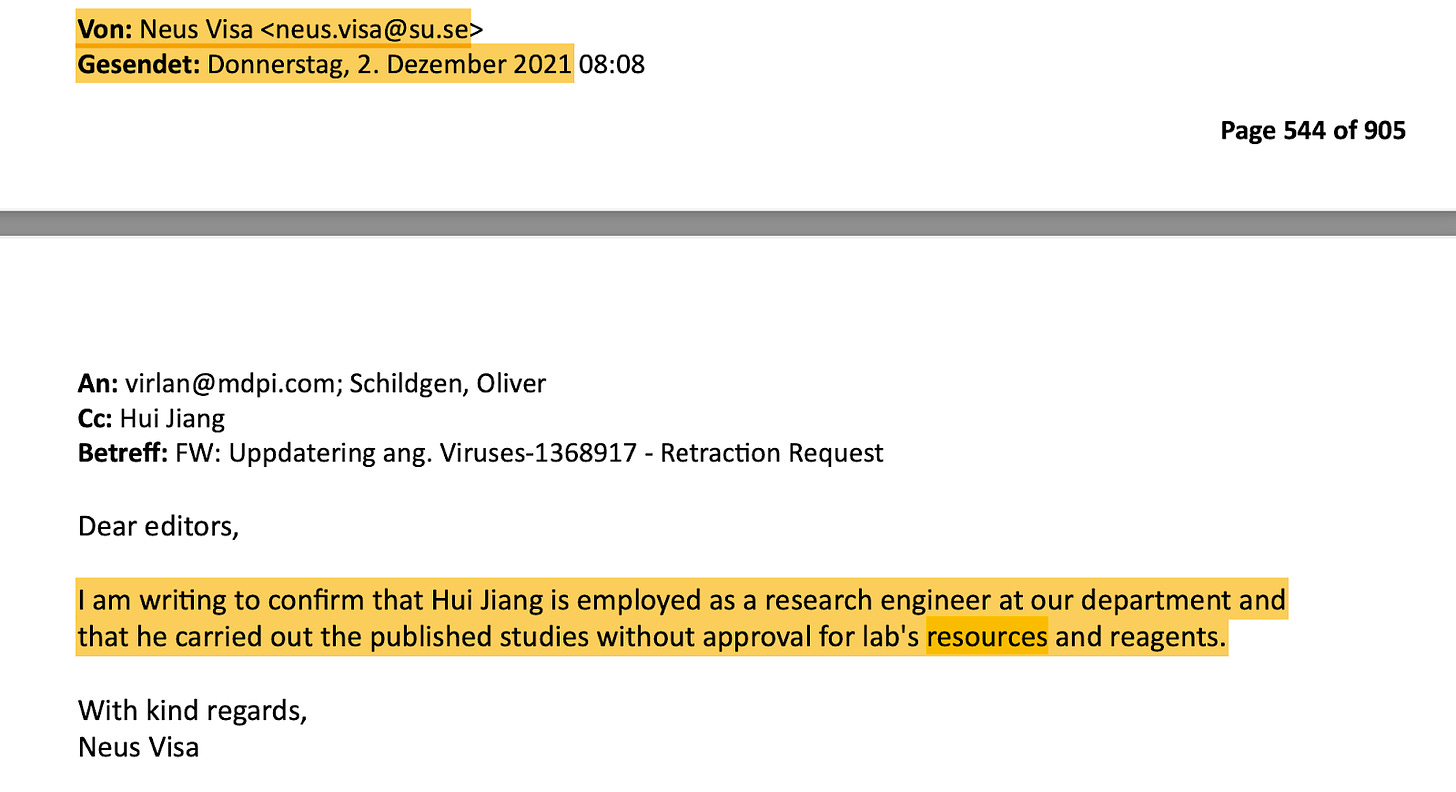
When I asked Mei about the use of resources in her study with Jiang, she countered that her lab “provided most chemicals, antibodies, plasmids, and the publication fee,” so any Stockholm University resources used in Jiang’s work for the study would have been minimal, even negligible.
However, even if Visa’s statement stood, this alone would not normally warrant a retraction.
“As I also receive requests and queries from public media meanwhile, this is urgent now.” – MDPI Academic Editor, Dr Oliver Schildgen
Schildgen said as much, suggesting that a correction may be the most appropriate action because, despite the publicity, “critical science is to be published.”
“While I agree that the usage of ressources (sic) should have been properly acknowledged and should be subject to a correction, my main question to all of you is if there is substantial scientific misconduct, is there any proof that the data were falsified?” he replied.
“As I also receive requests and queries from public media meanwhile, this is urgent now,” he wrote, suggesting that in the three and a half weeks since Jiang had first requested his retraction, neither the author or the university had managed to provide any convincing evidence of a scientific justification for it.
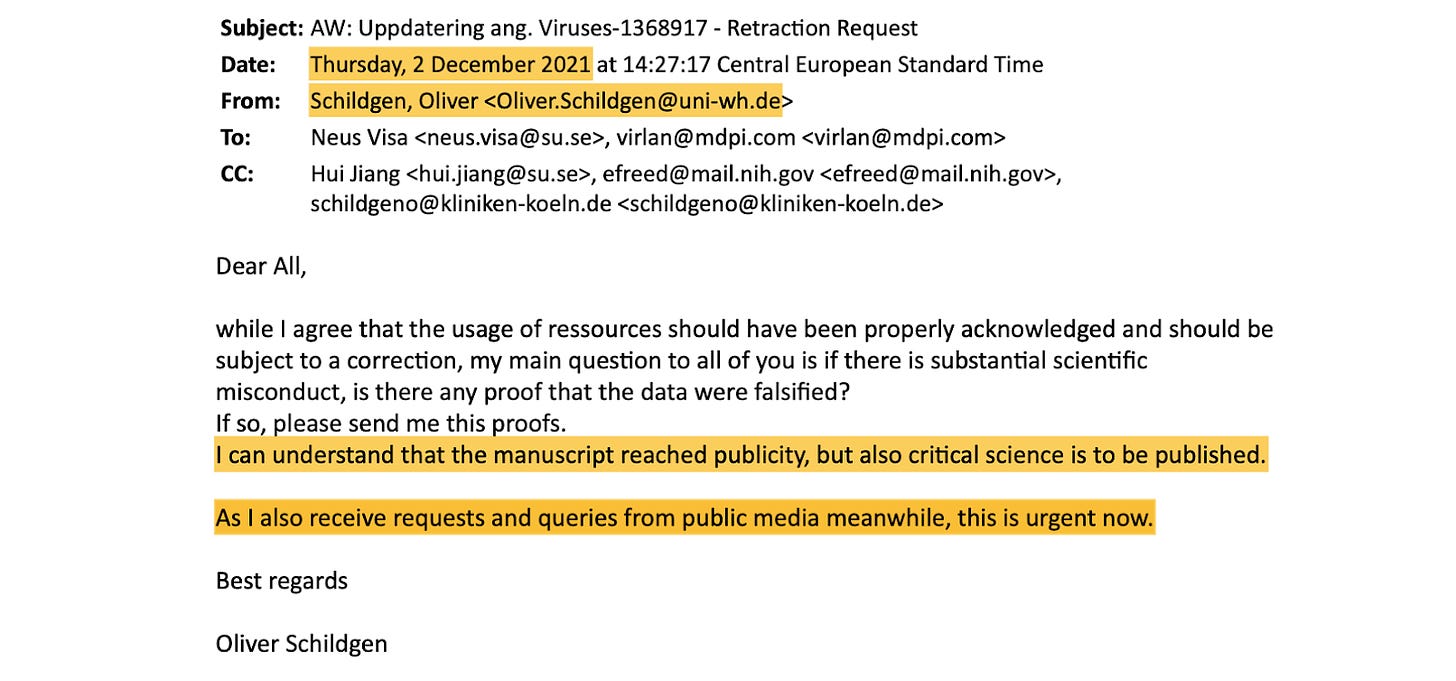
Then, Freed stepped in to suggest that the retraction could be completed without evidence of scientific misconduct (more about Freed shortly).
“Retraction of a paper does not require evidence of scientific misconduct.” – MDPI Chief Editor, Dr Eric Freed
“Just to add one important point: retraction of a paper does not require evidence of scientific misconduct. If the data are considered to be unreliable, if honest mistakes were made, etc., such that the conclusions are not valid, the paper should be retracted,” wrote Freed on 2 December.
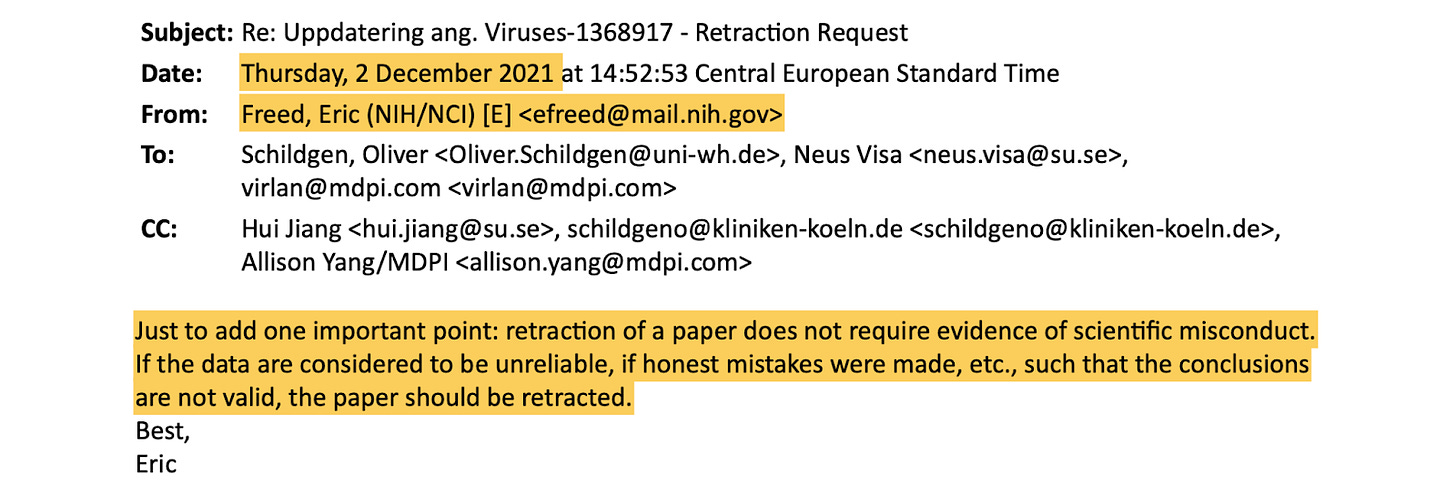
On 6 December, Visa confirms that though the university does not have any proof that the data were falsified, “the authors have revealed deviations from good research practice that should be sufficient to justify an immediate retraction of the article, as pointed out by Dr. Freed.”
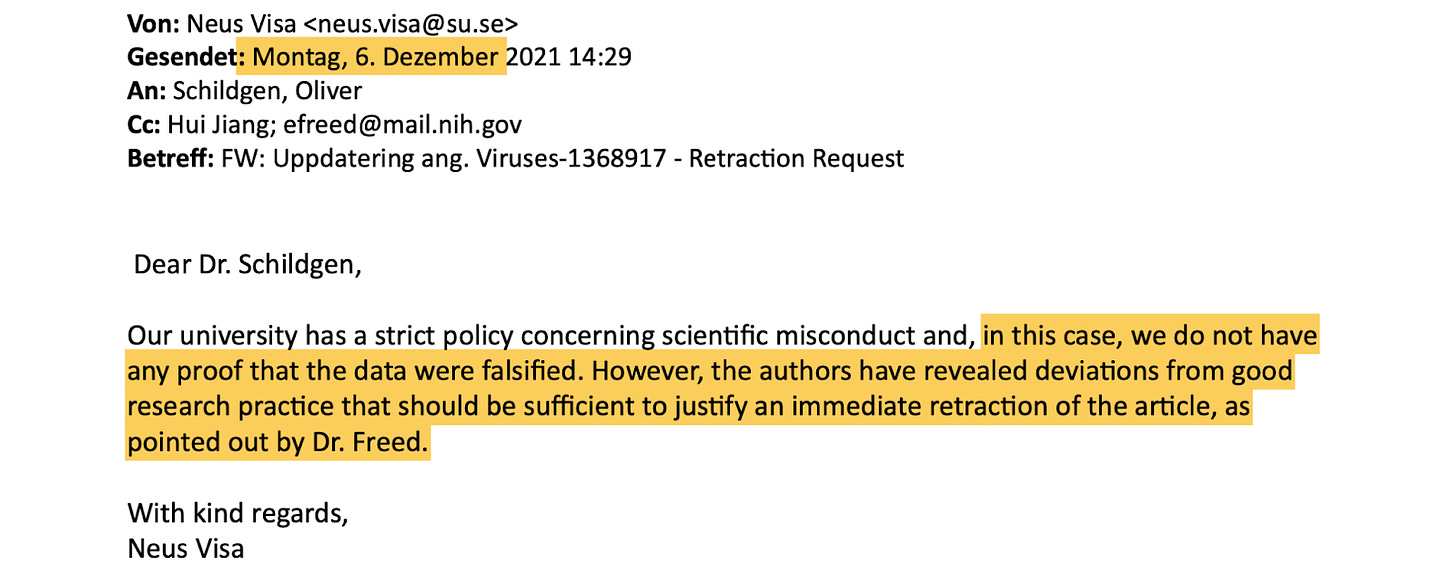
And with that, the fate of the Jiang and Mei paper was sealed, despite Mei’s protestations.
“I have to express my surprise about the entire history of this process,” said Schildgen.
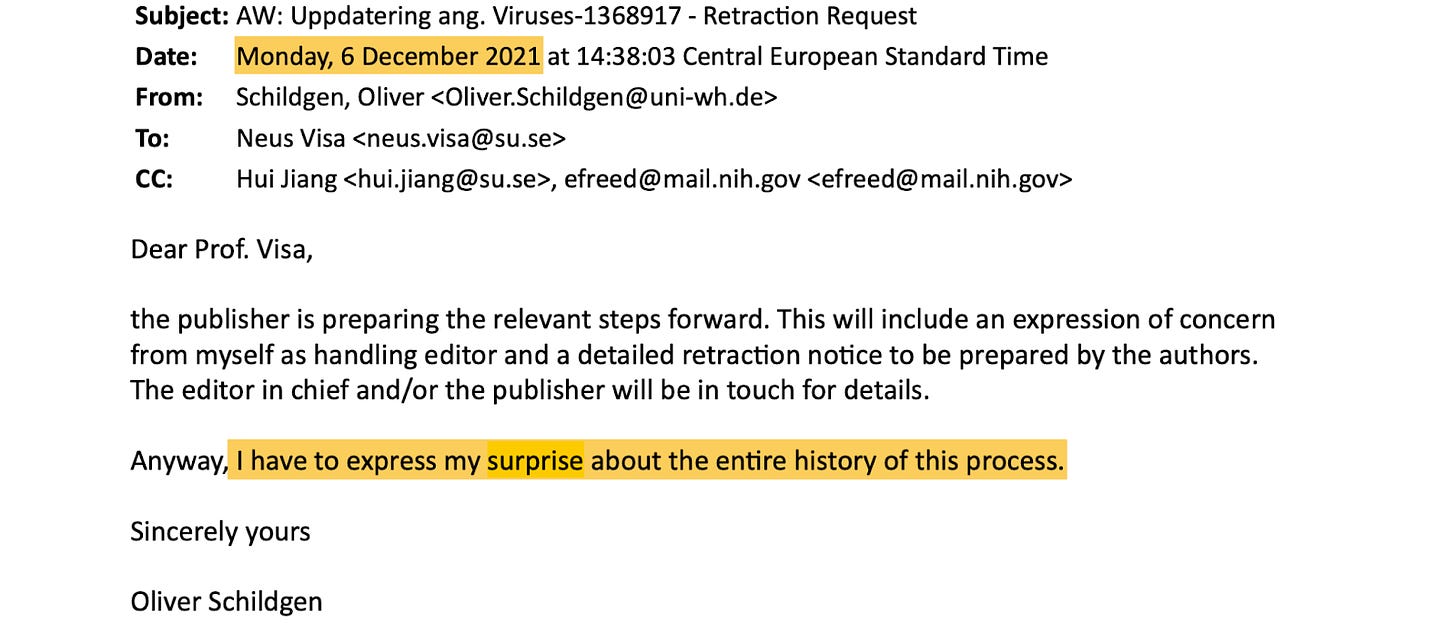
“I have to express my surprise about the entire history of this process.” – MDPI Academic Editor, Dr Oliver Schildgen
On 22 December 2021, an expression of concern written by Freed and Schildgen was published in the journal. It states, “One of the authors has raised concerns regarding the methodology employed in the study, the conclusions drawn and the insufficient consideration of laboratory staff and resources,” advising that an “in depth investigation” has been initiated.
On 10 May 2022, the paper was formally retracted, with a notice published in MDPI alleging “improper experimental design with the potential to significantly affect the integrity of the resultant experimental data.”
Hui Jiang’s retraction request
Under FOIA, I was able to obtain a copy of Jiang’s letter requesting retraction of his paper, which he emailed to the journal on 9 November 2021. This is the letter that MDPI Academic Editor Oliver Schildgen described as “rather generic.”
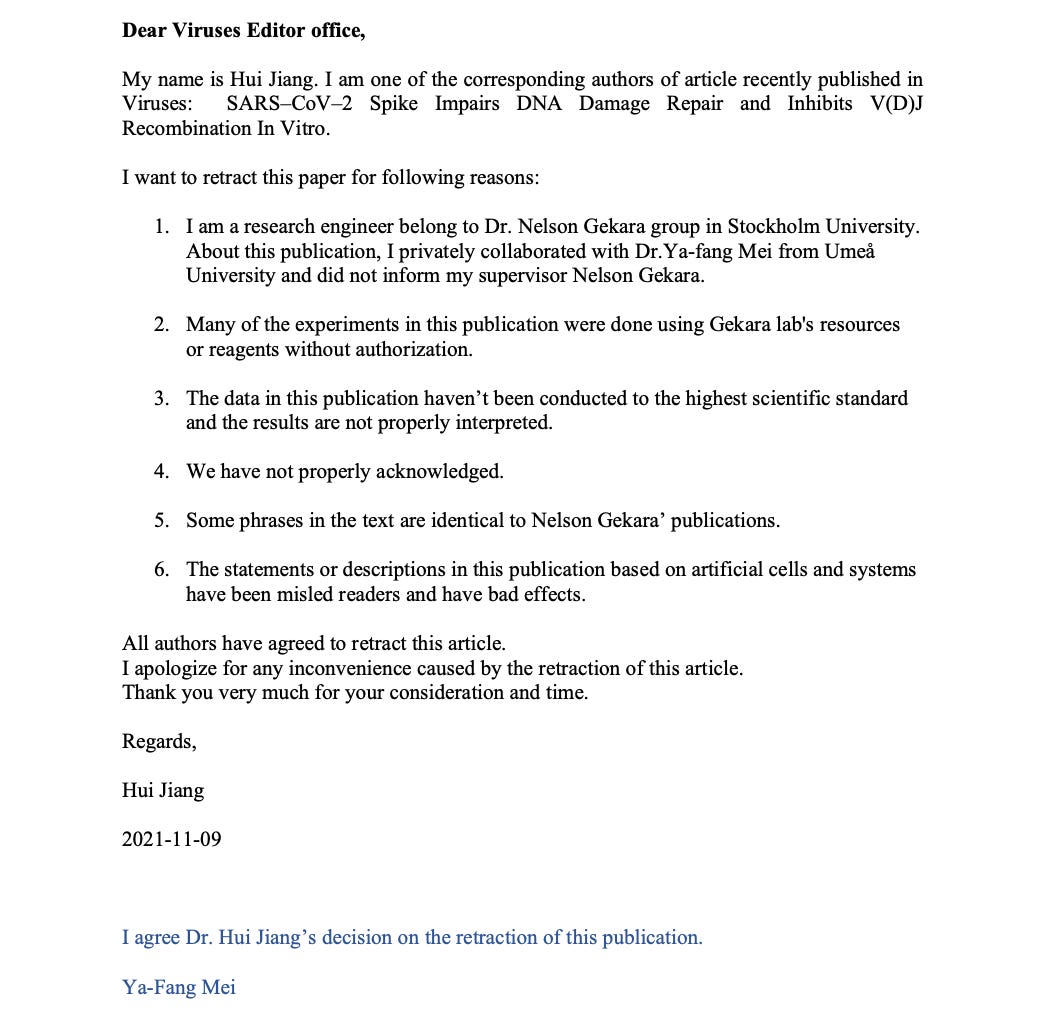
The letter has Mei’s name at the bottom. I asked if she consented to this, and she replied, “Yes. It was forced to do that (sic). Stockholm University issued an order. We were asked to submit the letter within 48 hours before checking the lab book and experiment protocols.”
However, after reviewing the lab books and protocols, Mei strongly opposed the retraction, and never signed the final formal retraction request.
In his letter, Jiang listed six reasons for requesting retraction. These need unpacking. There was no one better for me to ask than anonymous science blogger and whistleblower,
Following, Jiang’s reasons for retraction are dissected with commentary from Arkmedic.
- “I am a research engineer belong to Dr. Nelson Gekara group in Stockholm University. About this publication, I privately collaborated with Dr. Ya-fang Mei from Umeå University and did not inform my supervisor Nelson Gekara.”
Arkmedic: Failure to inform the supervisor of a research protocol is not a reason for retraction. Individual research experiments are conducted often without the supervisor being aware of them and in this case the supervising author on the study (Ya-Fang Mei) was the de facto supervisor.
- “Many of the experiments in this publication were done using Gekara lab’s resources or reagents without authorization.”
Arkmedic: The funding for these experiments and most of the lab reagents were provided by the supervising author (YFM). Gekara’s lab was already adequately funded for DNA signalling work from a Swedish government grant of which this work would easily qualify as related.
*RB note: Additionally, Mei asserts that her lab “provided most chemicals, antibodies, plasmids, and the publication fee.”
- “The data in this publication haven’t been conducted to the highest scientific standard and the results are not properly interpreted.”
Arkmedic: It is ridiculous that a first author would say that his/her own work was not conducted to the highest scientific standard. The interpretation of the results as described in the paper was correct. Interpretation of results beyond that described in the paper is not a reason for retraction.
- “We have not properly acknowledged.”
Arkmedic: Who was not properly acknowledged? The funding of the study was properly documented. Lack of acknowledgement is not a reason for retraction of a paper.
- “Some phrases in the text are identical to Nelson Gekara’ publications.”
Arkmedic: Which phrases? Which publications? It is expected that the same group re-use protocols from prior studies, in which the wording of such would be the same. In this case the authors used the COMET assay which they have described in a prior paper by Jiang and Gekara. Reuse of protocol descriptions from the same group are not a reason for retraction.
- “The statements or descriptions in this publication based on artificial cells and systems have been misled readers and have bad effects.”
Arkmedic: The paper clearly described the use of HEK293 cells which were also the cell lines used by Pfizer-BioNtech in their preclinical studies for the mRNA vaccine. It was an entirely appropriate cell line to use for this purpose. External misinterpretations of the ramifications of a study are not a reason for retraction.
The final published retraction notice makes no mention of most of the above listed concerns, including, conspicuously, Jiang’s claim that he plagiarised, which is a serious accusation. This suggests that Jiang was unable to produce evidence to support most of his reasons for retraction, which in turn gives the impression that the author of this letter (whoever wrote it) was clutching at straws to manufacture reasons to achieve a predetermined result: getting the paper retracted.
Implications for cancer and immune suppression
The significance of the retraction of Jiang and Mei’s paper being undermined with an expression of concern (December 2021) and then retraction (May 2022) during a period of time when billions of people were continuing to receive Covid vaccine injections is immense, says Arkmedic.
Arkmedic has previously discussed the Jiang and Mei paper in relation to immune suppression here:
For this investigation, I asked Arkmedic to summarise the significance of Jiang and Mei’s findings to immune suppression and cancer. His response follows (emphasis mine):
The Jiang and Mei study showed that the spike protein has a suppressive effect on a protein called p53, which is commonly called ‘guardian of the genome’ for its role in repairing DNA, which in turn helps to prevent cancer formation.
“The very heavy (90%) suppression of p53 in the study shows that the main cancer repair mechanism in the body can be suppressed by the presence of spike protein which was found in the nucleus of cells consistent with the findings in the preclinical studies submitted to the Therapeutic Goods Administration (FOI 2389 document 6) following application of the mRNA product.
“p53 suppression is a primary driver of a number of cancers but in particular pancreatic, breast, ovarian cancer and lymphoma. The biggest effect is seen in womens cancer where BRCA mutation, which interferes with p53 production, is associated with a dramatic increase in the lifetime risk of breast cancer to around 70% (from 12%) and ovarian cancer to around 50% (from 1.5%). This was seen in Angelina Jolie, for example, whose hereditary BRCA mutation led to her having a double mastectomy to prevent her getting breast cancer.
“Although the study implied that the presence of the COVID virus could have the same effect, in practical terms viruses tend to be present for a very short time and in a very low dose compared to the mRNA vaccine which has been shown in circulation beyond 28 days and in the lymph glands at least two months after injection.
“A very dramatic example of the possible effect of the mRNA products on cancer risk can be seen in the story of Michel Goldman reported in the Atlantic, a medical practitioner who developed lymphoma after vaccination and then whose lymphoma got dramatically worse following a booster dose.”
I also asked Arkmedic for his comment on the impact to health and science of these findings being question-marked in December 2021 and retracted in May 2022:
“In Australia up to around September 2021 there was a general reluctance to receive the mRNA COVID vaccines amongst people under 50 and pregnant women. This was then overriden by the vaccine mandates which were imposed around that time, resulting in the forced vaccination of most of the population in the subsequent nine months.
“During that time the paper was undermined by the retraction notices to such an extent that it could not be relied on to provide advice to those who were still considering vaccination. On that basis it could be estimated that some 20%-30% of the population were deprived of access to information that could reasonably have been considered such an important factor for consideration that they would have declined receipt of the product even in the presence of vaccine mandates due to the potential carcinogenicity risk.
“A further 20% of the population may have declined the product purely based on the existence of this risk. It could therefore be reasonably estimated that up to half of the excess cancers, as reported in the ABS provisional mortality reports (and any other reports as yet unpublished), might have been prevented had appropriate due diligence and pharmacovigilance been applied especially in the under 60 and female age groups who will likely be most affected.”
Medical educator Dr Mobeen Syed (aka ‘Dr Been’) posted a video to YouTube on 5 November 2021 about Jiang and Mei’s paper which has been watched over 1.4 million times. He neatly unpacks the risks that the spike protein poses to DNA repair processes, and the implications for cancer formation.
In the below excerpt, Dr Been explains, “Any cell that has spike protein in it, if it needs its DNA repaired [failure to repair DNA is one of the mechanisms of cancer].. then spike protein can reduce the DNA repair… Cancer cells are the cells where the DNA has escaped the repair.”
Amusingly, I discovered Dr Been’s video because Schuck specifically complained about it in one of his emails, describing the video as “pure anti-vaccine propaganda” that “has nothing to do with science.” Dr Been begs to differ, stating, towards the end of the video, his disappointment in people who accuse him of presenting only one side or the other of Covid vaccine science.
The Eric Freed connection, and NIH emails blocked in FOIA request
The strange circumstances surrounding the Jiang and Mei paper retraction led independent journalist John Davidson to do some digging. “Due to my background researching into medical fraud, members of the scientific community approached me pointing out their concerns regarding the retraction of the Jiang paper,” Davidson told me.
The emails provided by Stockholm University under my own FOIA request show that as Chief Editor of MDPI, Freed oversaw the process of retracting the Jiang and Mei paper. Additionally, it was Freed who insisted that evidence of scientific misconduct was not required to process the retraction.
In August 2022, Davidson submitted a Freedom of Information Access request (FOIA) for emails between MDPl’s Chief Editor, Eric Freed and Academic Editor Oliver Schildgen regarding the retraction. “As a member of the National Cancer Institute [operating under the US federal National Institutes for Health], Freed’s communications are supposed to be open to the public,” said Davidson.
After eight months of waiting, Davidson received notification in April 2023 that 490 pages of emails had been identified in response to his FOIA request. However, the NIH refused to release the emails to Davidson, citing Exemption 4 under the FOIA regulations, which “protects from disclosure trade secrets and commercial or financial information that is privileged and confidential.”
Davidson submitted an appeal, arguing that there was “an important public health benefit to releasing these communications” and that NIH had “failed to give sufficient weight to the public’s interest in disclosure.” His appeal was refused September 2023 on the same grounds as the first refusal.
“As we have learned in the past week thanks to David Morens, our scientists have no regard for the legal obligations to transparency and the people who pay their salaries,” Davidson told me this week, referring to the scandal in which the former Senior Adviser to Anthony Fauci was found to have deleted federal records and used personal email to dodge FOIA requests.
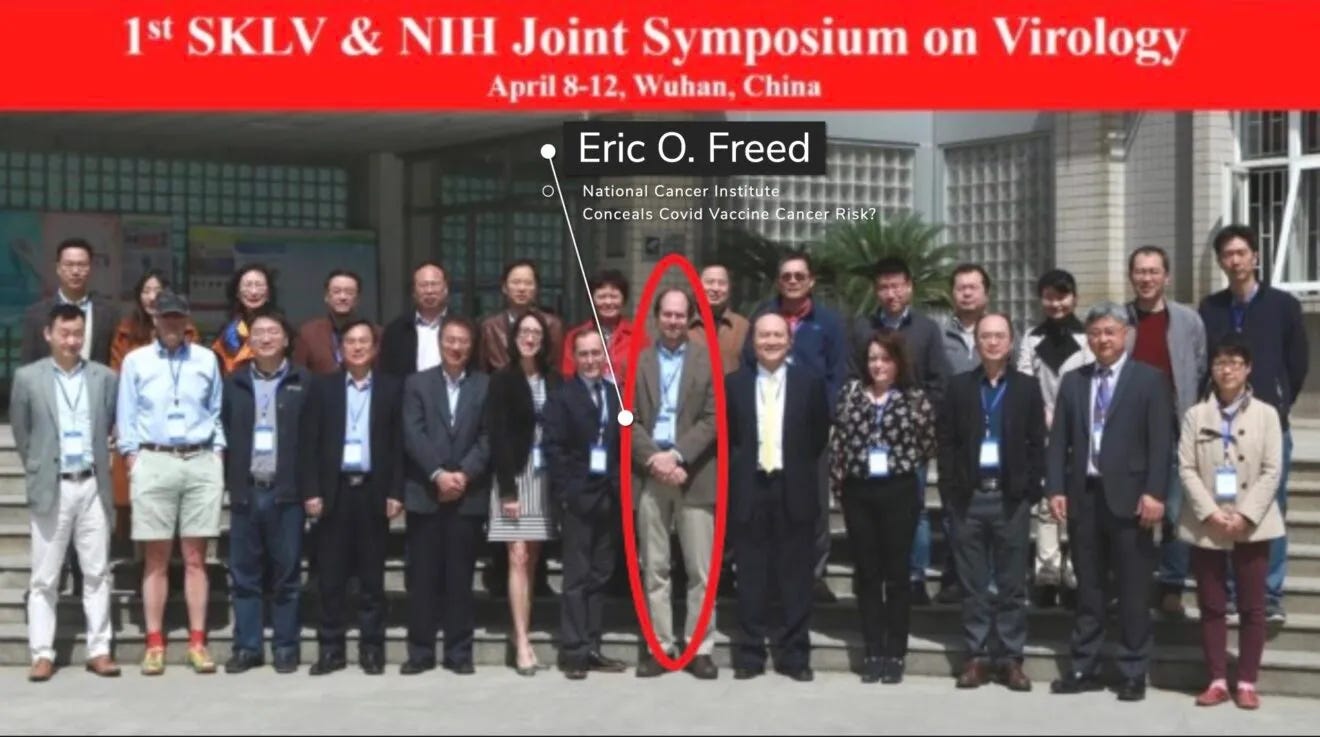
In light of recent developments with this investigation, Davidson has contacted Freed for comment, but at the time of publishing had not received a response.
Stockholm University and MDPI respond
I learned that Hui Jiang’s department at Stockholm University, the Wenner-Gren Institute, had initiated an investigation into the paper from one of Götz Schuck’s emails mentioning the fact.
I asked Neus Visa, head of the Wenner-Gren Institute when this investigation started and why. Visa replied,
“The reason for an internal informal investigation was that colleagues from Umeå university brought to the attention of Prof. Gekara that a paper by Hui Jiang and Ya-Fang Mei had just been published. Prof. Gekara immediately realized that the research had been conducted without his knowledge and authorization. The goal of the internal investigation was to clarify the circumstances in which the research had been carried out. The internal investigation started immediately (approx. 8th – 10th Nov 2021).”
Note that Hui Jiang’s retraction request letter was sent on 9 November, the day after Stockholm University’s internal investigation was initiated. Jiang’s supervisor, Nelson Gekara, is CCed.
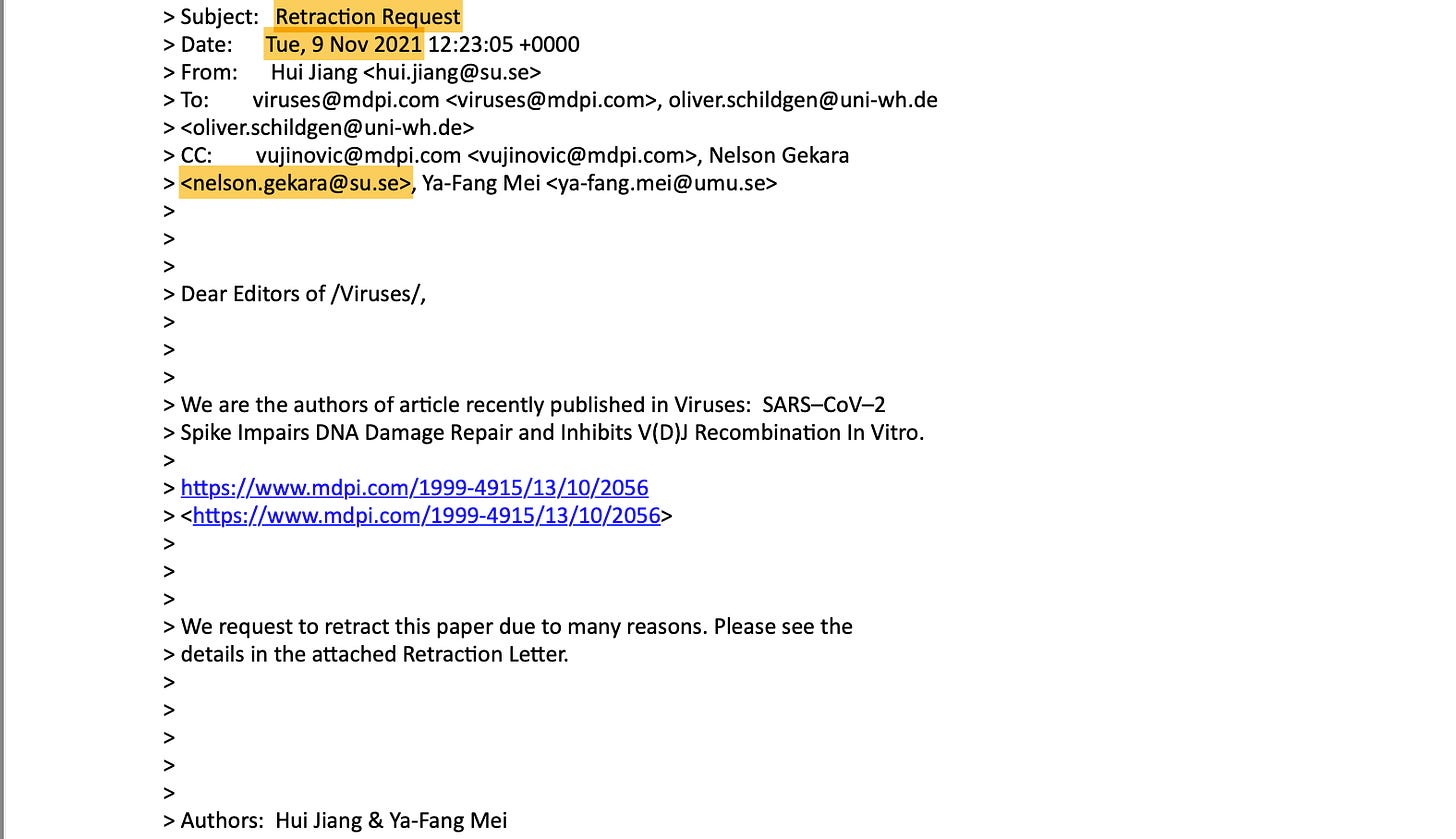
Note also that Dr Been’s viral YouTube video highlighting the implications of Jiang and Mei’s findings for cancer risk was posted on 5 November, three days before the investigation began.
I also asked the university’s press office about Freed’s role in the retraction, and whether pressure from academics, activists, pharmaceutical companies or others with vested interests play a part in the retraction?
A spokesperson responded,
“Stockholm University does not have insight into the retraction process. According to Swedish legislation and academic practice, Swedish researchers are the only owners of their research results (”upphovsrättsliga lärarundantaget”). As a consequence, researchers decide themselves if (and when) results should be published or retracted.
“Stockholm University did not take part in the retraction (and did not receive any pressure). The university’s research is truth-seeking, free and unbound. Stockholm University strives for an open scientific system, where everyone has free and open access to scholarly texts, research results and research data.”
“The scientific self-clearance process and a proper discussion, e.g. by a rebuttal letter or an accompanying contra-paper would have been sufficient.” – MDPI Academic Editor, Dr Oliver Schildgen
I also contacted MDPI Academic Editor Oliver Schildgen for comment. He offered the following by way of reply,
“The retraction was asked by one of the authors, and it is the journals policy that in those cases the editors have to publish a letter of concern and that the paper is retracted. Thus, in my function as an editor I have followed all COPE and editorial guidelines.”
Schildgen stated that he cannot share information pertaining to communications between himself and the authors, as “this would be a scientific and legal misconduct.”
“As editor I am always neutral and handle only those manuscripts where I have no conflict of interest,” he said.
When asked if he thought that retraction was the best course of action in light of the vigorous opposition by the second author, Ya-Fang Mei, Schildgen replied,
“In my opinion the scientific self-clearance process and a proper discussion, e.g. by a rebuttal letter or an accompanying contra-paper would have been sufficient, too. Please contact the editor in chief and the editorial office why this was not accepted.”
Götz Schuck was contacted for comment but did not respond.
Hui Jiang remains a ghost
Despite a concerted effort to reach Hui Jiang to hear his side of the story, I could not find contact details, and the one scientist I did find who fit his profile did not respond to my email. Jiang’s publishing record indicates that he left Stockholm University soon after the retraction incident and moved to China, from where he is publishing work prolifically.
Of the people who worked with Jiang or claim to have known him, none could or would pass on his contact details.
Gekara, corresponding author on Jiang’s last paper submitted while he was still at Stockholm University, claims he has no forwarding details. (The paper was published March 2023 but Gekara explained that it was submitted to the journal in April 2022, shortly before Jiang left the University)
Surprisingly, in his YouTube video about Jiang and Mei’s paper, Dr Been says that Jiang is his best friend from Sweden (01:45). I contacted Dr Been to ask if he knows anything about Jiang’s state or forwarding details, but did not receive a response.
Jiang and Mei vindicated
Two years after their scientific paper showing the spike protein from both the SARS-Cov-2 virus and the associated vaccines damages key DNA repair pathways was retracted under suspicious circumstances, Jiang and Mei have been vindicated.
Multiple high-quality papers have now entered the scientific record confirming and building upon Jiang and Mei’s results. Just last month, a paper by two senior cancer experts at Brown University, Professors Shengliang Zhang and Wafik El-Deiry, was published in the journal Oncotarget showing that the spike protein has a suppressive effect on the tumour suppressor protein p53.
This finding is suggestive that “the SARS-CoV-2 spike causes an altered DNA damage sensing and repair response in cancer cells,” wrote the authors. This can lead to the development of tumors and may inhibit positive effects of cancer therapeutics.
Furthermore, the authors noted that the finding applies to both wild virus spike protein and vaccine spike protein, stating, “Our findings have implications for the natural history of prolonged or repeated SARS-CoV-2 infection as well as design of anti-COVID-19 vaccines that are administered repeatedly as booster shots. Further studies are needed to unravel and clarify issues raised to minimize various risks.”
Hui and Jiang’s mistake, it seems, is not that they were wrong. It’s that they were right at the wrong time.
With special thanks to
and
, who did much of the groundwork research in the early stages of this investigation, and who consulted on this article.
From rebekabarnett.com
Disclaimer: We at Prepare for Change (PFC) bring you information that is not offered by the mainstream news, and therefore may seem controversial. The opinions, views, statements, and/or information we present are not necessarily promoted, endorsed, espoused, or agreed to by Prepare for Change, its leadership Council, members, those who work with PFC, or those who read its content. However, they are hopefully provocative. Please use discernment! Use logical thinking, your own intuition and your own connection with Source, Spirit and Natural Laws to help you determine what is true and what is not. By sharing information and seeding dialogue, it is our goal to raise consciousness and awareness of higher truths to free us from enslavement of the matrix in this material realm.
 EN
EN FR
FR



